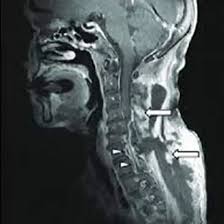Book an Appointment
MRI Neck With Contrast
Medifyhome has collaborated with the best pathology laboratories that are NABL and NABH certified and follow ISO safety guidelines to provide the best MRI Neck With Contrast at an affordable price for needy individuals. MRI of the neck with contrast is a non-invasive imaging test that uses powerful magnets and radio waves to create detailed pictures of the structures within the neck, including the spinal cord, nerves, blood vessels, soft tissues, and bones. It does not use radiation as in other traditional imaging techniques. When combined with a contrast agent, usually gadolinium-based, this imaging technique provides enhanced views of blood vessels and soft tissues, making it possible to diagnose a wide range of medical issues more accurately. The contrast dye allows abnormalities that are not detectable on a standard MRI to be brought to light, particularly in the carotid arteries, spinal cord, and lymph nodes. It is very useful in identifying vascular conditions, tumors, nerve compression, infections, and inflammatory diseases. You might have symptoms such as neck pain, difficulty swallowing, or unexplained swelling; an MRI of the neck with contrast will reveal all this and much more about your neck and the structures surrounding it. To schedule an appointment for a MRI Neck With Contrast, simply contact Medifyhome or call our customer care at +919100907036 or +919100907622 for more details and queries.
How Does MRI of the Neck with Contrast Work?
An MRI of the neck with contrast is a form of diagnostic imaging that utilizes very powerful magnetic fields and radio waves to produce detailed images of structures in the neck, such as muscles, blood vessels, nerves, and tissues.
- The Process of an MRI
Magnetic Field and Radio Waves: MRI works through a strong magnetic field that aligns hydrogen atoms in your body. The moment you step into the MRI machine, it creates a magnetic field that excites the hydrogen atoms in your body. Then, the MRI scanner sends a pulse of radio waves to temporarily disturb the alignment of these atoms. As the atoms come back to their original position, they emit signals that are detected by the MRI machine.
- Role of Contrast in MRI
Contrast Agent The most common contrast agent used in MRI is a chemical that contains the rare earth metal, gadolinium. Gadolinium aids in increasing the visibility of blood vessels, abnormal growths, and other specific types of tissues by altering the magnetic properties of water molecules in the body.
- What Does Neck MRI with Contrast Visualize?
Neck MRI with contrast provides clear images of the following structures:
Blood Vessels:
The carotid arteries (that are supplying blood to the brain), jugular veins, and smaller vessels in the neck can be seen and hence conditions such as stenosis of the carotid artery, aneurysms, or vascular malformations may be found.
Soft Tissues:
The MRI may visualize muscles, glands, and other connective tissues of the neck. This can help identify abnormalities in structures, including:
The thyroid gland – check for nodules or cancer of the thyroid.
Salivary glands.
Lymph nodes.
- The Procedure
Preparation: Prior to having the MRI, the patient is usually required to remove any metallic items, including jewelry, hairpins, and hearing aids. They are then covered with a hospital gown during the imaging.
Contrast Injection: A nurse or technician will insert an intravenous line into a vein of your arm to administer the contrast agent. This is normally done just before or during imaging.
Scan Duration: The time taken by the MRI itself is 30 to 60 minutes. During that time, you will need to stay as motionless as possible for clear images to be produced. The device will also make loud thumping and banging noises, for which ear protection will be provided.
- Why Contrast in MRI of Neck
Improved Sensitivity: Contrast agent makes visible certain structures like blood vessels, tumors, and soft tissues. The radiologist is then better able to see normal from abnormal tissues in the area of interest, thereby improving diagnosis.
Detection of Abnormalities: For neck cancers, for example, tumors, or vascular abnormalities, contrast MRI will provide much-needed information about the size, shape, and location of the problem, guiding treatment.
Conditions Diagnosed by MRI of the Neck with Contrast
This test called an MRI of the neck with contrast provides high resolution images for the soft tissues of the neck, the blood vessels and structures. Hence, diagnosis of a large variety of conditions is highly possible. Following are a few of those diagnoses that could be done through this imaging test:
- Carotid Artery Disease
It can help detect narrowing or blockages in the carotid arteries. This is basically an artery that plays a huge role in bringing blood to the brain. Thus, MRI with contrast helps to detect stenosis caused by narrowing and plaque buildup due to atherosclerosis, which might lead to an increased risk of stroke.
Carotid Artery Aneurysms: The contrast agent improves the images of the carotid arteries so that doctors can identify aneurysms that are likely to rupture.
Vascular Malformations: Contrast MRI can help diagnose conditions like arteriovenous
2. Tumors and Cancer
Thyroid Cancer: MRI of the neck with contrast can be used to spot thyroid nodules and eventually thyroid cancer by giving a detail image of the thyroid. The contrast helps in displaying abnormal growths or malignancies.
Salivary Gland Tumors: The parotid, submandibular, and sublingual glands are all structures within the neck. MRI with contrast can visualize benign or malignant tumors in these glands to measure their size, location, and relationship to surrounding tissues.
Lymphoma: In cancers such as lymphoma, MRI is particularly useful at identifying lymph node involvement, especially with the use of contrast to outline enlarged or abnormal lymph nodes.
- Lymphadenopathy (Enlarged Lymph Nodes)
Infection: Enlarged lymph nodes may suggest infections in the neck region, for example, bacterial or viral infections, including mononucleosis or tuberculosis. MRI contrast can assist in distinguishing infected from non-infected lymph nodes.
Inflammatory Diseases: MRI can diagnose the swelling of lymph nodes due to chronic inflammation or autoimmune diseases, such as sarcoidosis or rheumatoid arthritis.
- Nerve and Spinal Disorders
Cervical Spinal Cord Disorders: MRI with contrast is useful in the evaluation of cervical spine abnormalities that may involve nerves, such as herniated discs, spinal stenosis, or degenerative disc disease.
Nerve Compression: Conditions such as cervical radiculopathy (pinched nerve in the neck) or brachial plexus injuries can be diagnosed. The contrast will highlight nerve root impingement and inflammation.
- Infections and Inflammatory Conditions
Abscesses: Sensitivity of MRI with contrast is seen in the detection of abscesses, also known as pockets of pus in the neck, which occurs due to bacterial infections. This contrast enhances areas of infection and thereby assesses the size and location of the abscess.
Cellulitis and soft tissue infections: Infections in the soft tissues of the neck, such as cellulitis, necrotizing fasciitis, or phlegmon, which presents as an inflamed area of tissue, can be assessed well with MRI contrast, which helps to differentiate between the infected tissue and normal tissue.
Benefits of MRI of the Neck with Contrast
MRI of the neck with contrast has many advantages, especially for diagnosing a wide range of conditions affecting the neck’s structures, including soft tissues, blood vessels, and organs. Here are the most important benefits of undergoing an MRI of the neck with contrast:
- High-resolution, detailed imaging
Better image quality: The MR image can easily visualize the anatomy in high detail for all of the neck soft tissues and its vessels, nerves, and bones. Therefore, highly resolution images provide good appreciation for complex anatomy at that place and at its sides.
Soft Tissue Visualization: MRI is particularly good at imaging soft tissues such as muscles, lymph nodes, glands (such as thyroid and salivary glands), and nerves, which are hard to evaluate by other imaging modalities such as X-ray or CT scans.
- Non-Invasive and Safe Diagnostic Tool
No Radiation: It is safer in contrast to a CT scan or X-rays as MRI does not employ the ionizing radiation, and its usage will be repeated when patients require avoiding exposure of the ionizing radiation to prevent pregnancy and young children.
Non-Invasive: This procedure does not have the surgical requirements and has not put instruments into the body, yet it offers excellent information in place of further diagnostic procedures that are very invasive.
- Accurate Diagnosis of Complex Neck Conditions
MRI with contrast can identify a wide variety of conditions, making it essential for accurate diagnosis, including:
Tumors and Cancer: It can detect benign and malignant tumors in the thyroid, salivary glands, lymph nodes, and other soft tissues of the neck. Contrast enhances the ability to see the size, location, and vascularity of tumors, which is essential in deciding whether a mass is benign or malignant.
- Early Detection and Precise Monitoring
Early diagnosis of cancer: MRI with contrast helps in the early detection of cancers, such as thyroid cancer or head and neck squamous cell carcinoma, by providing detailed images of tumors and their spread. Early detection is key for effective treatment and improved prognosis.
Monitoring Tumor Progression: For patients on treatment for cancer or tumors, MRI with contrast can be used to monitor the effectiveness of treatments, such as surgery, radiation, or chemotherapy, by comparing the size and characteristics of the tumor before and after therapy.
- Enhanced Visualization of Blood Vessels
The contrast agent enhances visualization of blood vessels, so doctors can more clearly evaluate the condition of the carotid arteries, jugular veins, and all the other vascular structures within the neck.
Assessment of Carotid Artery Disease: MRI with contrast proves very useful in the detection of carotid artery stenosis, which forms the greatest risk factor in the causation of strokes. It can also find plaques or atherosclerosis and assess the demand for intervention.
Preparation for MRI of the Neck with Contrast
Preparing for an MRI of the neck with contrast is relatively easy. Instructions should be followed strictly according to your healthcare provider or imaging center regarding how to prepare so as not to have your tests falsified and also not causing you discomfort. Key preparation steps and guidelines for getting ready are summarized below.
- Fasting instructions
Fasting Requirements: In most cases, you will be required to fast for 4 to 6 hours before the MRI, especially if the contrast agent (gadolinium) is being injected intravenously. Fasting is necessary to ensure that your stomach is empty, thus helping to reduce the risk of nausea during the procedure. For other patients, fasting may not be necessary, so you need to follow the specific instructions given by your healthcare provider.
Water Intake: You will be permitted to have minimal intakes of water but caffeinated beverages and alcohol must be avoided as these affect the body’s reaction to the contrast agent.
- Medication Review
Informed Your Doctor of your Medications: In order to prepare for an MRI, you should be open with your doctor or the radiology technician about your medication intake. This will include prescription drugs, over-the-counter medications, and even dietary supplements. Some medications have to be adjusted prior to your MRI procedure.
Stopping Certain Medications: If you’re on medications like diuretics or metformin (for diabetes), your doctor might advise you to stop them temporarily before the test, especially if you’re getting contrast, as these may affect kidney function or react with the contrast agent.
- Clothing and Accessories
Wear Comfortable Clothing: On the day of the MRI, you will be asked to remove any clothing that has metal fasteners, zippers, or buttons. The best thing to wear for an MRI is loose comfortable clothing without metal objects.
Remove Jewelry and Accessories: Take off all jewelry, watches, hairpins, glasses, and other metal items because these can interfere with the MRI scan. The MRI images can be distorted or even pulled into the magnetic field, which is unsafe.
Hairpins and Dentures: Even hairpins, earrings, bracelets, and dentures must be removed before entering the MRI machine to avoid interference with the magnetic field.
- Consent for Contrast Agent
Contrast Injection Consent You will be required to sign a consent form for the use of the contrast agent before the MRI procedure. The contrast dye is given through an IV line injected into a vein, which is usually located in the arm. Side effects may occur, although these are rare. Patients may report a warm sensation or a metallic taste during the administration of the contrast, which may be temporary.
Pre-Procedure Blood Work: If you have a history of kidney disease or are at risk of kidney problems, your doctor may order a blood test (such as serum creatinine) before the procedure to assess your kidney function and ensure that it’s safe to use the contrast agent.
- During the MRI Procedure
Positioning: When you arrive at the MRI, you will be asked to lie down on the MRI table, and the technologist will help position you properly for the scan. For a neck MRI, you may need to lie flat on your back with your neck in a neutral position.
Remain still: It is very important to remain as motionless as possible during the scan. Movement will blur the images, and the results will not be as clear and may require repeating the procedure.
Contrast Injection: The technologist will inject the contrast agent into a vein during the procedure, usually into your arm. You could feel a slight pinch from the injection site, as well as a warm or tingling sensation as the contrast enters your body.
- Test Type: MRI Neck With Contrast
- Preparation:
- Wear a loose-fitting cloth
- Fasting not required
- Carry Your ID Proof
- Prescription is mandatory for patients with a doctor’s sign, stamp, with DMC/HMC number; as per PC-PNDT Act
- Reports Time: With in 4-6 hours
- Test Price: Rs.3500
How can I book an appointment for a MRI Neck With Contrast through Medifyhome?
To schedule an appointment for a MRI Neck With Contrast, simply contact Medifyhome or call our customer care at +919100907036 or +919100907622 for more details and queries.
What is the definition of an MRI of the Neck with Contrast?
It is an imaging diagnostic technique whereby structures in your neck are portrayed in detail with Magnetic Resonance Imaging (MRI). The use of contrast agent-based, usually gadolinium-based, enhances blood vessels and soft tissues, so it increases the visibility of nerves and conditions such as vascular disorders, tumors, and other diseases that may be located inside or around the structure of interest.
Why Do I Need an MRI of the Neck with Contrast?
Your doctor may recommend an MRI of the neck with contrast if you are experiencing symptoms such as neck pain, swelling, difficulty swallowing, or unexplained dizziness. The procedure is useful for diagnosing a variety of conditions, including:
- Carotid artery disease or blockages
- Spinal cord abnormalities
- Tumors or cysts
- Nerve compression or herniated discs
- Infections or inflammatory conditions
How Does the Contrast Work During the MRI?
An MRI of the neck with contrast uses a special dye called a contrast agent, usually gadolinium, that is injected into your bloodstream. This agent helps to enhance the view of certain parts of the body, such as blood vessels and tissues, and makes abnormalities in blood flow easier to visualize. Doctors are thus better able to understand your condition.
Is the MRI of the Neck with Contrast painful?
No, the MRI of the neck with contrast is typically not painful. You will be placed on a table that slides into the MRI machine and are required to be very still. This may be somewhat uncomfortable, but most patients can tolerate this for short periods. Contrast is typically given via IV and produces a cold or warmth sensation in your arm. A few people experience claustrophobia, but this procedure is not painful.
How long does the procedure take?
The whole MRI process takes about 30 to 45 minutes. The actual imaging part takes around 20-30 minutes, but some extra time is required for contrast injection and positioning adjustments.
Do I need to prepare for the MRI of the Neck with Contrast?
Yes, there are a few basic preparation steps:
- Clothing: Wear comfortable clothing without any metal parts, as metal can interfere with the MRI.
- Allergies: Inform your doctor if you have a history of allergic reactions to contrast agents or iodine.
- Medical history: Share any information about your kidney function, as certain kidney conditions can affect the use of the contrast agent.
- Food and Drink: You don’t need to fast beforehand for an MRI, but if you are to be sedated, you may be asked to refrain from eating or drinking for several hours before the test.
Are there risks associated with the Neck MRI with Contrast?
The MRI itself is a relatively safe procedure, but there are some risks to consider:
- Contrast agent reactions: Seldom, patients may develop slight allergic reactions to the contrast dye, such as itchy skin, rash, or nausea. In more serious cases, such effects rarely occur.
- Kidney concerns: Patients who suffer from kidney problems may face more risks with the contrast agent. So, you should always disclose the presence of kidney diseases or any concerns related to the functioning of your kidneys with your doctor.
- Pregnancy: Because MRI does not utilize radiation, the contrast agent can be avoided in pregnancy unless absolutely required.
Why Choose Medifyhome for MRI Neck With Contrast?
Medifyhome is an online medical consultant that provides home-based medical services not only in your area but also in most cities in India, including Hyderabad, Chennai, Mumbai, Kolkata, and more. We have collaborated with diagnostic centers that have the best machines and equipment to ensure you get accurate results. Medifyhome provides 24-hour customer service for booking the appointment of the services and guides you with instructions. Medifyhome also provides the best diagnostic centers at low prices. Once you receive your test results, you can easily book an appointment with our network of experienced doctors for consultation. To schedule an appointment for a MRI Neck With Contrast, simply contact Medifyhome or call our customer care at +919100907036 or +919100907622 for more details and queries.





